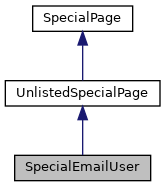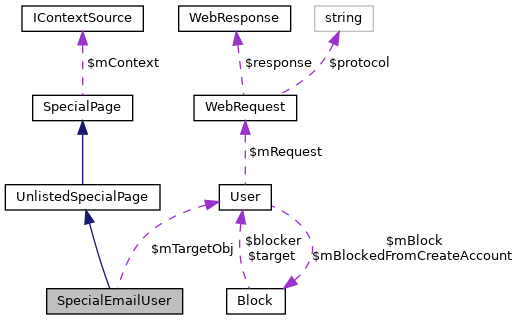A special page that allows users to send e-mails to other users. More...


Public Member Functions | |
| __construct () | |
| execute ( $par) | |
| Default execute method Checks user permissions, calls the function given in mFunction. More... | |
| getDescription () | |
| Returns the name that goes in the <h1> in the special page itself, and also the name that will be listed in Special:Specialpages. More... | |
 Public Member Functions inherited from UnlistedSpecialPage Public Member Functions inherited from UnlistedSpecialPage | |
| __construct ( $name, $restriction='', $function=false, $file='default') | |
| isListed () | |
| Whether this special page is listed in Special:SpecialPages. More... | |
 Public Member Functions inherited from SpecialPage Public Member Functions inherited from SpecialPage | |
| __construct ( $name='', $restriction='', $listed=true, $function=false, $file='default', $includable=false) | |
| Default constructor for special pages Derivative classes should call this from their constructor Note that if the user does not have the required level, an error message will be displayed by the default execute() method, without the global function ever being called. More... | |
| checkPermissions () | |
| Checks if userCanExecute, and if not throws a PermissionsError. More... | |
| checkReadOnly () | |
| If the wiki is currently in readonly mode, throws a ReadOnlyError. More... | |
| displayRestrictionError () | |
| Output an error message telling the user what access level they have to have. More... | |
| getContext () | |
| Gets the context this SpecialPage is executed in. More... | |
| getFile () | |
| Get the file which will be included by SpecialPage::execute() if your extension is still stuck in the past and hasn't overridden the execute() method. More... | |
| getFinalGroupName () | |
| Get the group that the special page belongs in on Special:SpecialPage Use this method, instead of getGroupName to allow customization of the group name from the wiki side. More... | |
| getFullTitle () | |
| Return the full title, including $par. More... | |
| getLang () | |
| Shortcut to get user's language. More... | |
| getLanguage () | |
| Shortcut to get user's language. More... | |
| getLocalName () | |
| Get the localised name of the special page. More... | |
| getName () | |
| Get the name of this Special Page. More... | |
| getOutput () | |
| Get the OutputPage being used for this instance. More... | |
| getPageTitle ( $subpage=false) | |
| Get a self-referential title object. More... | |
| getRequest () | |
| Get the WebRequest being used for this instance. More... | |
| getRestriction () | |
| Get the permission that a user must have to execute this page. More... | |
| getSkin () | |
| Shortcut to get the skin being used for this instance. More... | |
| getTitle ( $subpage=false) | |
| Get a self-referential title object. More... | |
| getUser () | |
| Shortcut to get the User executing this instance. More... | |
| including ( $x=null) | |
| Whether the special page is being evaluated via transclusion. More... | |
| isCached () | |
| Is this page cached? Expensive pages are cached or disabled in miser mode. More... | |
| isExpensive () | |
| Is this page expensive (for some definition of expensive)? Expensive pages are disabled or cached in miser mode. More... | |
| isIncludable () | |
| Whether it's allowed to transclude the special page via {{Special:Foo/params}}. More... | |
| isRestricted () | |
| Can be overridden by subclasses with more complicated permissions schemes. More... | |
| listed ( $x=null) | |
| Get or set whether this special page is listed in Special:SpecialPages. More... | |
| msg () | |
| Wrapper around wfMessage that sets the current context. More... | |
| outputHeader ( $summaryMessageKey='') | |
| Outputs a summary message on top of special pages Per default the message key is the canonical name of the special page May be overridden, i.e. More... | |
| requireLogin ( $reasonMsg=null, $titleMsg=null) | |
| If the user is not logged in, throws UserNotLoggedIn error. More... | |
| run ( $subPage) | |
| Entry point. More... | |
| setContext ( $context) | |
| Sets the context this SpecialPage is executed in. More... | |
| setHeaders () | |
| Sets headers - this should be called from the execute() method of all derived classes! More... | |
| setListed ( $listed) | |
| Set whether this page is listed in Special:Specialpages, at run-time. More... | |
| userCanExecute (User $user) | |
| Checks if the given user (identified by an object) can execute this special page (as defined by $mRestriction). More... | |
Static Public Member Functions | |
| static | getPermissionsError ( $user, $editToken) |
| Check whether a user is allowed to send email. More... | |
| static | getTarget ( $target) |
| Validate target User. More... | |
| static | submit (array $data, IContextSource $context) |
| Really send a mail. More... | |
| static | uiSubmit (array $data, HTMLForm $form) |
| Submit callback for an HTMLForm object, will simply call submit(). More... | |
 Static Public Member Functions inherited from SpecialPage Static Public Member Functions inherited from SpecialPage | |
| static | getSafeTitleFor ( $name, $subpage=false) |
| Get a localised Title object for a page name with a possibly unvalidated subpage. More... | |
| static | getTitleFor ( $name, $subpage=false, $fragment='') |
| Get a localised Title object for a specified special page name. More... | |
Protected Member Functions | |
| getFormFields () | |
| getGroupName () | |
| Under which header this special page is listed in Special:SpecialPages See messages 'specialpages-group-*' for valid names This method defaults to group 'other'. More... | |
| userForm ( $name) | |
| Form to ask for target user name. More... | |
 Protected Member Functions inherited from SpecialPage Protected Member Functions inherited from SpecialPage | |
| addFeedLinks ( $params) | |
| Adds RSS/atom links. More... | |
| afterExecute ( $subPage) | |
| Gets called after. More... | |
| beforeExecute ( $subPage) | |
| Gets called before. More... | |
| getRobotPolicy () | |
| Return the robot policy. More... | |
Protected Attributes | |
| $mTarget | |
| User string | $mTargetObj |
| $mTargetObj More... | |
 Protected Attributes inherited from SpecialPage Protected Attributes inherited from SpecialPage | |
| IContextSource | $mContext |
| Current request context. More... | |
| $mIncludable | |
| $mIncluding | |
| $mName | |
Detailed Description
A special page that allows users to send e-mails to other users.
Definition at line 29 of file SpecialEmailuser.php.
Constructor & Destructor Documentation
◆ __construct()
| SpecialEmailUser::__construct | ( | ) |
Definition at line 36 of file SpecialEmailuser.php.
Member Function Documentation
◆ execute()
| SpecialEmailUser::execute | ( | $subPage | ) |
Default execute method Checks user permissions, calls the function given in mFunction.
This must be overridden by subclasses; it will be made abstract in a future version
- Parameters
-
string | null $subPage
Reimplemented from SpecialPage.
Definition at line 99 of file SpecialEmailuser.php.
References $error, $form, $out, $params, $ret, $title, array(), SpecialPage\getContext(), getFormFields(), SpecialPage\getOutput(), SpecialPage\getPageTitle(), getPermissionsError(), SpecialPage\getRequest(), getTarget(), SpecialPage\getUser(), Status\isGood(), list, SpecialPage\msg(), SpecialPage\outputHeader(), SpecialPage\setHeaders(), userForm(), and wfRunHooks().
◆ getDescription()
| SpecialEmailUser::getDescription | ( | ) |
Returns the name that goes in the <h1> in the special page itself, and also the name that will be listed in Special:Specialpages.
Derived classes can override this, but usually it is easier to keep the default behavior.
- Returns
- string
Reimplemented from SpecialPage.
Definition at line 40 of file SpecialEmailuser.php.
References getTarget(), SpecialPage\msg(), and text.
◆ getFormFields()
|
protected |
Definition at line 49 of file SpecialEmailuser.php.
References array(), SpecialPage\getName(), SpecialPage\getUser(), Linker\link(), and SpecialPage\msg().
Referenced by execute().
◆ getGroupName()
|
protected |
Under which header this special page is listed in Special:SpecialPages See messages 'specialpages-group-*' for valid names This method defaults to group 'other'.
- Returns
- string
- Since
- 1.21
Reimplemented from SpecialPage.
Definition at line 379 of file SpecialEmailuser.php.
◆ getPermissionsError()
|
static |
Check whether a user is allowed to send email.
- Parameters
-
$user User object string $editToken edit token
- Returns
- null on success or string on error
Definition at line 212 of file SpecialEmailuser.php.
References $user, array(), global, wfDebug(), and wfRunHooks().
Referenced by ApiEmailUser\execute(), and execute().
◆ getTarget()
|
static |
Validate target User.
- Parameters
-
string $target target user name
- Returns
- User object on success or a string on error
Definition at line 180 of file SpecialEmailuser.php.
References User\getId(), User\newFromName(), and wfDebug().
Referenced by ApiEmailUser\execute(), execute(), getDescription(), and submit().
◆ submit()
|
static |
Really send a mail.
Permissions should have been checked using getPermissionsError(). It is probably also a good idea to check the edit token and ping limiter in advance.
- Parameters
-
array $data IContextSource $context
- Returns
- Mixed: Status object, or potentially a String on error or maybe even true on success if anything uses the EmailUser hook.
Definition at line 303 of file SpecialEmailuser.php.
References $error, $from, array(), getTarget(), IContextSource\getUser(), global, IContextSource\msg(), UserMailer\send(), text, wfMessage(), and wfRunHooks().
Referenced by ApiEmailUser\execute(), and uiSubmit().
◆ uiSubmit()
◆ userForm()
|
protected |
Form to ask for target user name.
- Parameters
-
string $name user name submitted.
- Returns
- String: form asking for user name.
Definition at line 257 of file SpecialEmailuser.php.
References $name, array(), Xml\closeElement(), SpecialPage\getPageTitle(), global, Html\hidden(), Xml\inputLabel(), SpecialPage\msg(), Xml\openElement(), Html\rawElement(), Xml\submitButton(), and text.
Referenced by execute().
Member Data Documentation
◆ $mTarget
|
protected |
Definition at line 30 of file SpecialEmailuser.php.
◆ $mTargetObj
|
protected |
$mTargetObj
Definition at line 34 of file SpecialEmailuser.php.
The documentation for this class was generated from the following file:
- includes/specials/SpecialEmailuser.php
